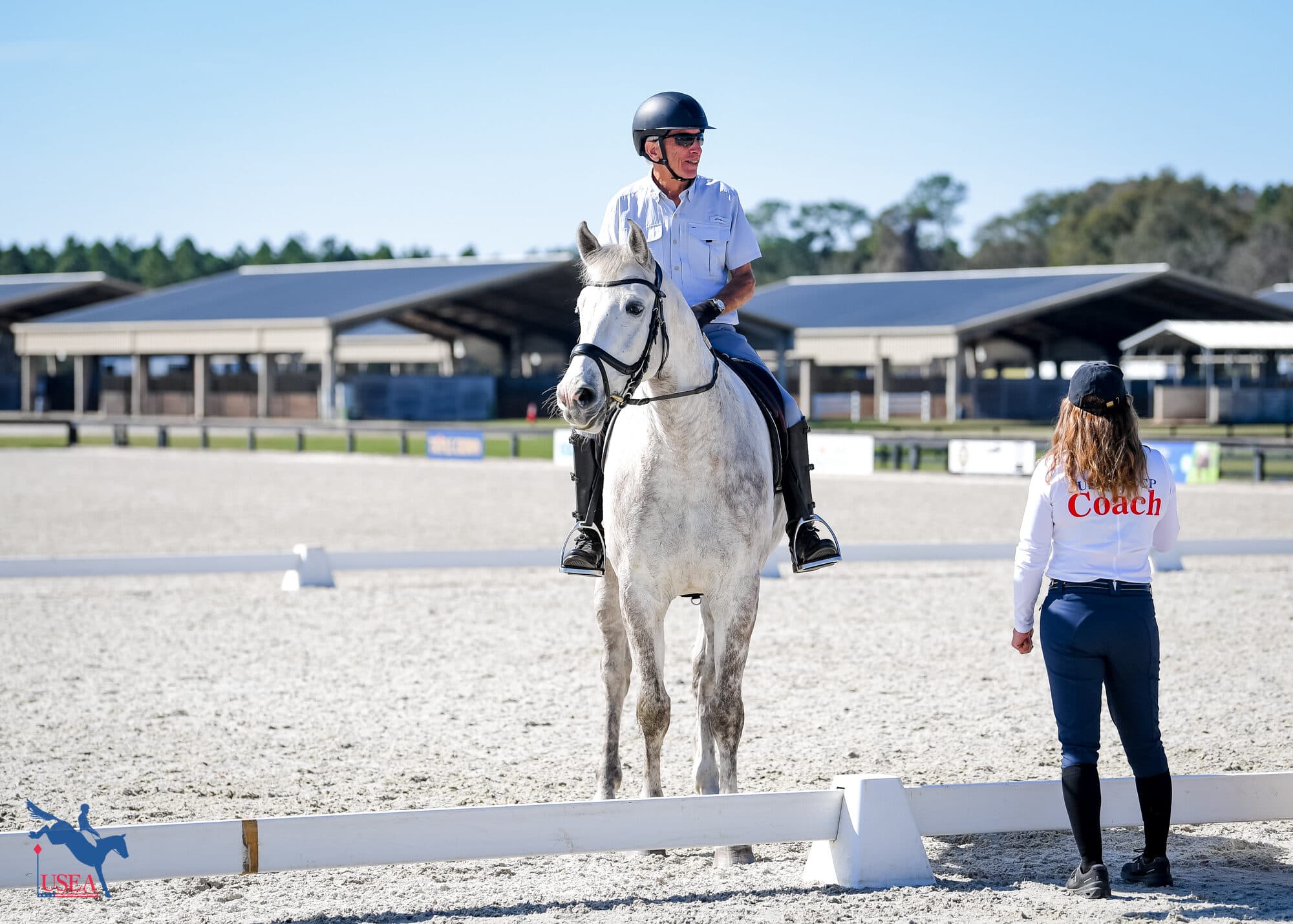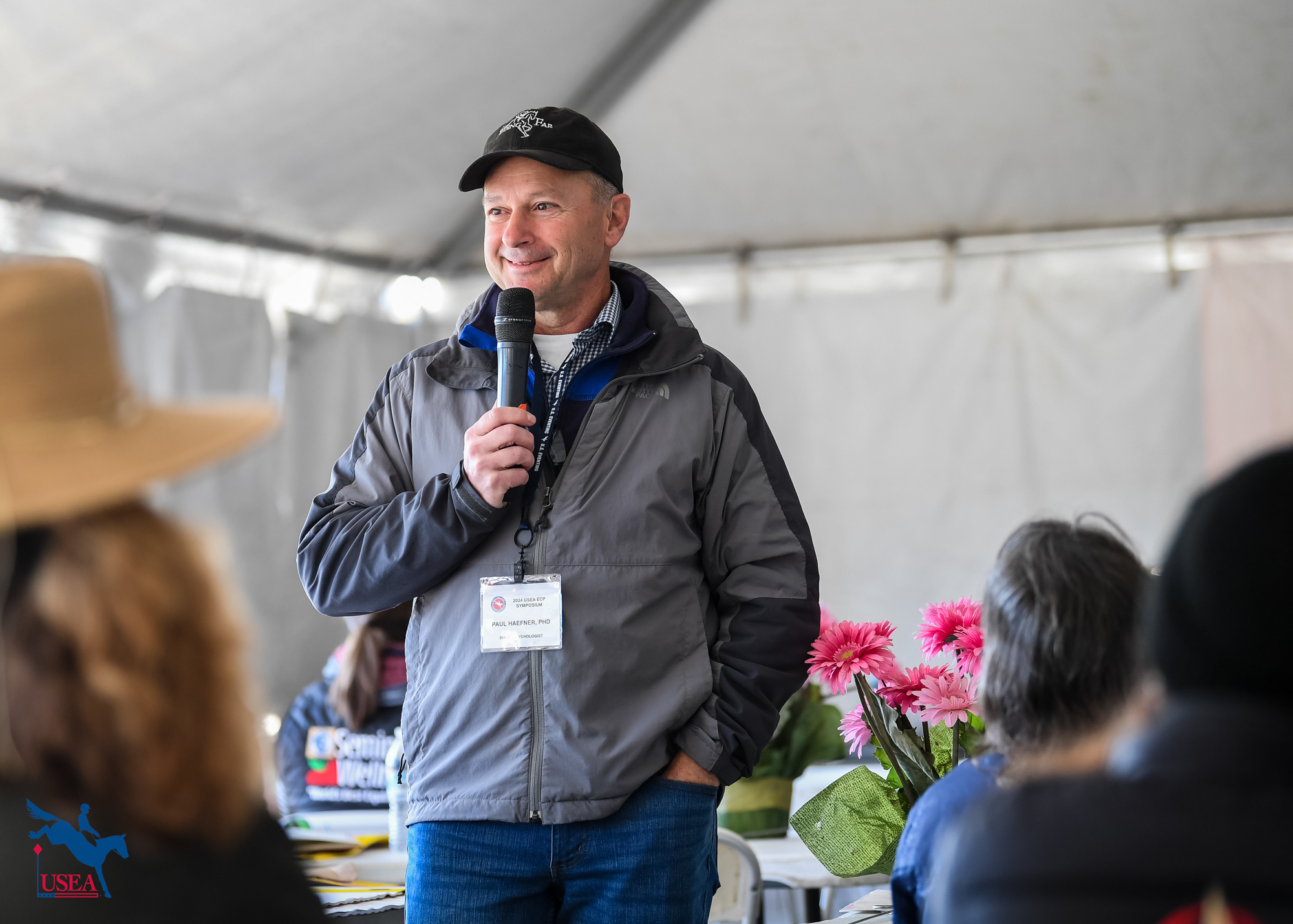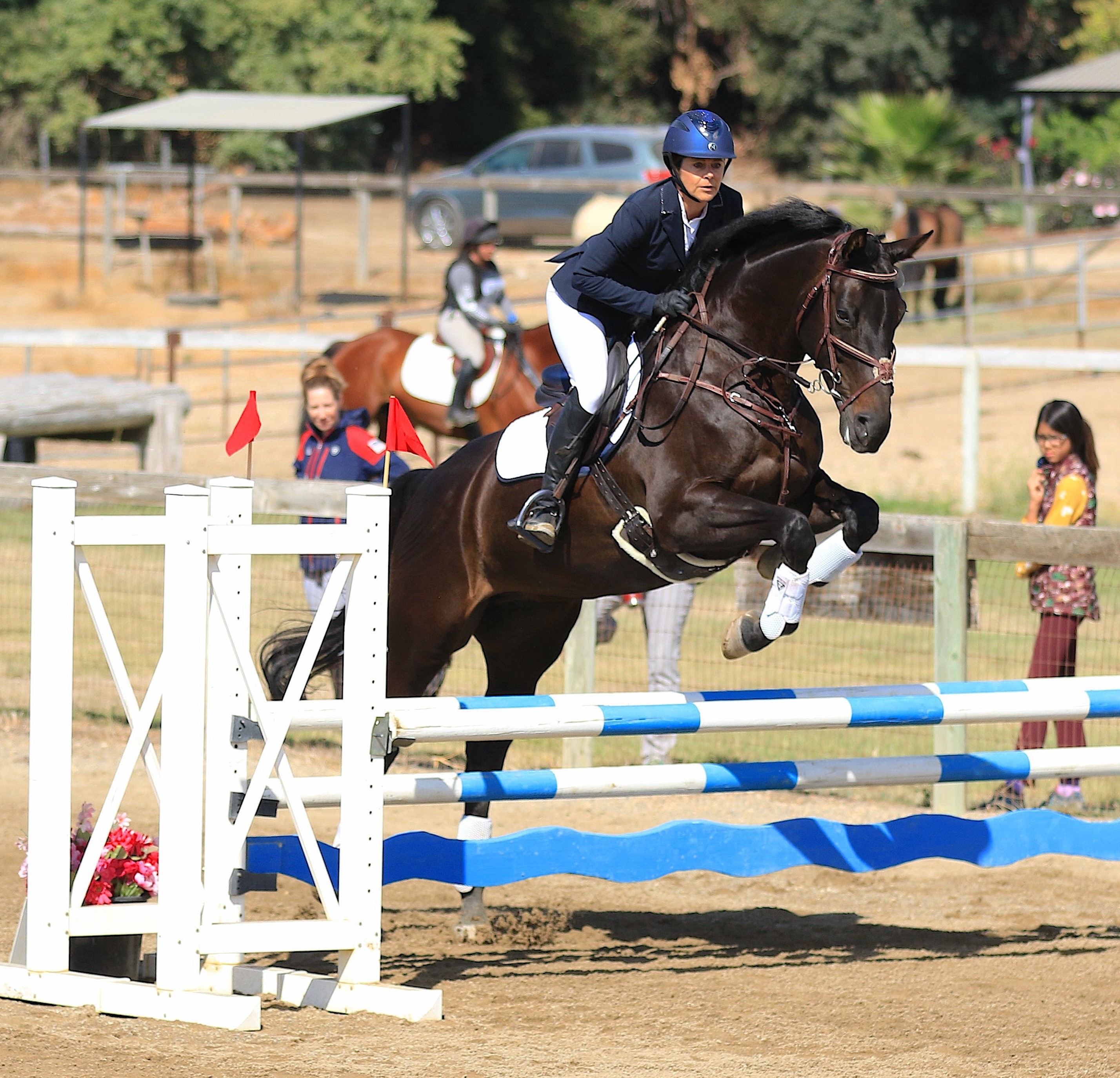Understanding the Way Adults Like to Learn, Both In and Out of the Saddle

What started as an opportunity to gain feedback from participants in an Adult Rider Camp, turned into something so much more and USEA Area VI Adult Rider Coordinator Sharl Talan is eager to share all that she gleaned from the experience with coaches and adult riders across the country.
Upon conclusion of the camp, Talan decided to tap into some of the skills acquired when obtaining her Master’s in Public Education and create a survey for participants to complete surrounding their experience. This survey polled participants on the efficacy of the instructors, their interest in activities (both in and out of the saddle), and other areas of education that the riders would like to pursue at future camps. The feedback received sparked a whole new discussion.
“I think the concepts of conducting clinician evaluation and then providing the clinician’s with feedback, as well as making an effort to understand adults as riders, both fall under the umbrella of improving instruction while also improving the experiences of adult riders. I believe it is imperative that we, the USEA, work to retain this major group of riders as much as possible, and assisting clinicians and teachers to better understand what motivates adults as well as how best they learn has the potential to keep adult riders engaged and active in the USEA organization.”
Talan, who is also an active adult amateur competitor herself at the age of 62, can relate to the opinions of the members who responded to the survey.
“The adult amateur rider makes up the largest group of members in the Area VI membership (I’m checking on this),” she continued. “You have the adult amateur who is 23, but who hasn’t had kids yet. And then you have the adult amateur who is running a company or staying at home and raising a family or who took a big gap in their riding career, so this is a very diverse population in relation to life experience. These older adults differ from young adults because over time they have developed practical intelligence which is based on prior life and riding experiences. Adult learners/riders prefer practice over theory and need to understand the value of the exercise and how it will help them achieve their goals.”

Sport psychologist Dr. Paul Haefner, Ph.D., also chimed in on those attributes specific to adult riders.
“There are five things that I go back to thinking about when evaluating any rider: What are their motivations? What are their goals? What resources do they have to support them? What are the risks and what risks are they willing to accept? And lastly, what relationships do they have in place to support them?”
Haefner noted that motivations, goals, and resources all seem to shift naturally over time, but the final two of those attributes can seem to pose the biggest challenges for adult riders.
“Quite honestly, I think risk is where the action is a lot of times for adult riders. There are conflicts that they experience within themselves, especially for re-riders who have raised their families and are ready to get back in the saddle,” he noted. “And finally with relationships, they are very powerful and meaningful. It is very important to them to have the support of their families and that our recreational pursuits are not a significant conflict in our primary relationships.”
With the feedback from her clinic participants in mind, Talan cracked out the books she most frequently used to create lesson plans for the adult learner, Wlodlowski’s Enhancing Adult Motivation to Learn and Cross’s Adults as Learners, to put some practical methods in place for upcoming adult rider activities in her area.
The first focus of her efforts was to identify what sets adults as learners apart from children or young adults. Talan noted that adults have a greater desire to learn for a sense of accomplishment, effectiveness, and value for what is being learned. From her resources, she put together the following list of characteristics that adult riders are more likely to possess (rather than children or adolescents) and the ways that riding coaches or clinicians can respond to them:
Adult riders are more likely:
- To use relevance (what matters rather than what is playful or stimulating) as the ultimate criteria for sustaining their interest
- Coach action: Ask the rider what goal they have in the lesson. Try to gain an understanding of what is most relevant and important to them.
- To be more critical and self-assured about their judgment of the value of what they are learning
- Coach action: Check in with the rider regarding the activity/exercise– Do they understand the value of the activity? If not, provide more information – get the rider’s buy-in.
- To be reluctant to learn what they cannot endorse by virtue of its value, usefulness, or contribution to their goals
- Coach action: Check in with the rider to ascertain understanding of the activity and of its value/usefulness in contributing to their goals.
- To be sensitive to and require respect from their teachers as a condition for learning
- Coach action: Always conduct the lesson with respect and sensitivity– this is critical to the adult learning process.
- To want to actively test what they are learning in real life settings/exercises and practice
- Coach action: create opportunities for riders to practice and test the concepts/skills being taught.
- To want to use their experience and prior learning as consciously and as directly as possible while learning
- Coach action: Have a brief discussion with the rider prior to teaching the activity in order to use and gauge the rider’s experience in the discussion/instruction of the new concept/skill being taught.
One of the biggest pieces of feedback that Talan pulled from her own studies was in relation to an adult rider’s motivation for learning.
“If adults have a problem experiencing success or even expecting success, their motivation for learning will usually decline,” she shared. “And although the meaning of success may vary depending on life experiences, or in this case level of riding competency, adults pay keen attention to indicators of success while learning.”
How can a clinician foster an environment that motivates an adult rider to continue to learn? By celebrating success, no matter how big or how small.
Talan also noted that according to recent research into both the social sciences and neurosciences, there are at least four motivational conditions that can substantially enhance an adult’s motivation to learn. These four conditions are: inclusion, attitude, meaning, and competence.

Inclusion, by definition, is “the action or state of including or of being included within a group or structure.” Adult riders by nature thrive in environments where they feel supported by their peers, so in activities such as rider camps where you are bringing together a group of people who may not know one another well, creating activities that foster inclusivity is a must. It is also important to create that sense of connectedness between rider and clinician/coach to create the foundations of a successful learning environment.
Dr. Haefner shared that a way that clinicians can successfully incorporate inclusion tactics in their clinic settings is by having the riders share more detail about themselves or their riding history either verbally at the start of the clinic or in the sign-up process.
“Ask for a summary of their experiences and their strengths and challenges,” he shared. “I know that adds to the time to the clinic or its preparation process, I appreciate the realities of that, but it will help the clinician know if there is a rider present who is particularly fearful or one who is extremely ambitious.”
The second of the four conditions is attitude.
“Attitudes powerfully affect human behavior and learning because they help people make a sense of their world,” noted Talan. “Attitudes can be personally helpful, as in the case of a positive expectancy for success, or they can be personally harmful, as in the case of an intense fear of failure. As an instructor of adults, you can be assured that students’ attitudes will be an active influence on their motivation to learn. Adult riders will immediately make judgments about you, the particular subject/task, the learning situation, and their personal expectancy for success.”
Sample activities for coaches surrounding this condition include a coach asking their riders for feedback on an exercise or activity that they might like to achieve or engage in during an upcoming lesson.
The key to impacting attitude in a positive manner, noted Talan, is around the feedback that these riders receive.
“Coaches should provide riders with tasks suitable to their capabilities and look for opportunities to provide positive feedback, even if just related to effort and dedication.”
The third condition, meaning, sustains involvement, according to Talan.
“Making, understanding, and changing meaning are fundamental aspects of adult development that continuously take place in a sociocultural context. What does this mean? When the brain receives new information, it searches existing neural networks for a place for the new information to fit. If there is a connection, then the new information makes sense. However, to have meaning, the new information has to be relevant. So, while the adult learning may feel included and have a positive attitude, their involvement will diminish if they don’t find meaning in the information/task. Meaning is the core of motivation and learning for adults because it is where their ideas and emotions join to fulfill their personal commitments.”
With that in mind, it is critical for coaches to provide opportunities for the rider to respond to questions or provide feedback on certain exercises and that coaches facilitate many check-ins to make sure that the riders understand the purpose of the task at hand. This allows adult riders the opportunity to find a clearer meaning in the exercise as it relates to his or her own experiences.
Last, but definitely not least, is the condition of competence. It's important to remember here that for all riders, not just adult riders, competence builds confidence. But especially in relation to adults, we most frequently view competence as the desire to be effective at what we value. When a person is confident in what they are doing, they are supported emotionally in their effort to learn new skills.
“To feel assured that one’s talents and effort can lead to new learning and achievement is a powerful and lasting motivational resource,” said Talan. “Instructors can help adults learn to be confident by establishing conditions that engender competence.”
Coaches can do so by providing specific and constructive feedback. Feedback is the most powerful communication tool that instructors can regularly use to affect riders’ competence.
“Effective feedback is positive,” said Talan. “Positive feedback emphasizes improvements and progress rather than deficiencies and mistakes. It increases riders’ intrinsic motivation, feelings of well being, and sense of competence and helps riders form a positive attitude toward the source of information, in this case the instructor.
Adults prefer positive feedback because when they are trying to improve; emphasis on errors and deficiencies (negative feedback) can be discouraging. When a rider is prone to making mistakes, the instructor’s pointing out a decrease in errors may be considered positive feedback. Also positive feedback can be given with constructive feedback. For example, an instructor might say to a rider, ‘You’ve been able to master most of this activity; let’s look at where you’re getting stuck.’”
With all of these things in mind, Talan has already begun preparations for this summer’s Area VI Adult Rider Camp and intends on utilizing some of the great feedback she received from participants in discussing the various riding activities with the instructors and facilitating activities that the adult riders might have indicated they would most enjoy.
“I think there are probably other opportunities to use this information to continue to engage our older riders and facilitate an environment where they want to keep riding,” Talan shared. “Even though Adult Riders may have shifted their goals from winning to something more personal, clinicians play a very important role in keeping these members active in USEA if they can try to understand and help riders achieve their goals."
Intrigued by the content in this article? Stay tuned for a follow-up article with more expansion on Dr. Paul Haefner’s thoughts surrounding coaching riders from all walks of life, adult riders included.















